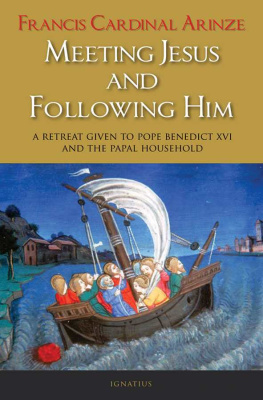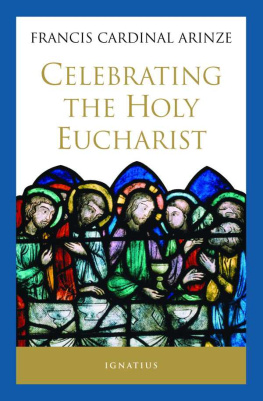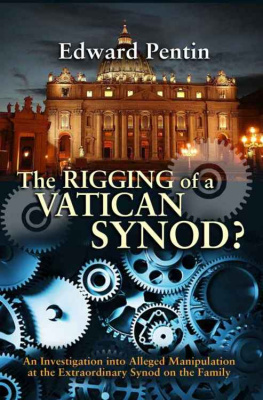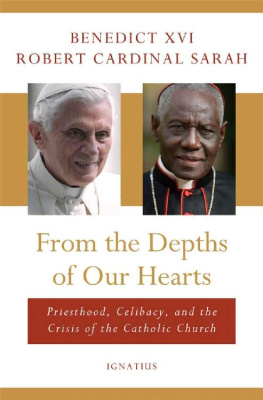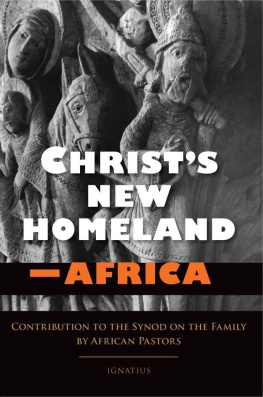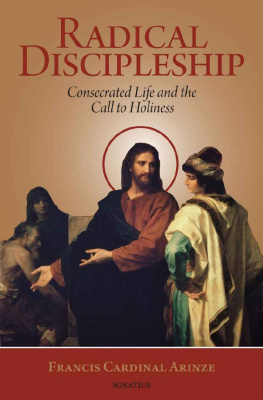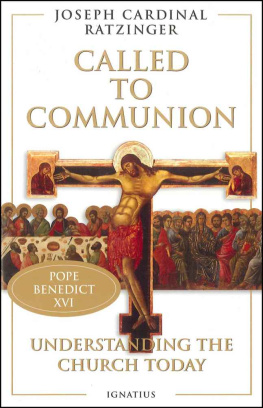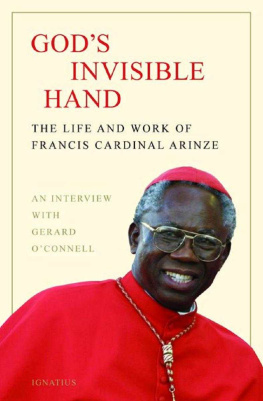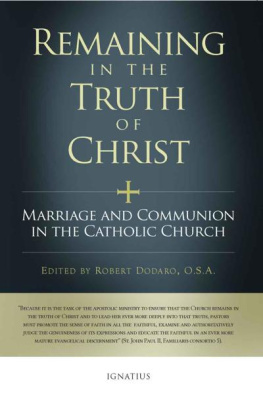The Laypersons Distinctive Role
FRANCIS CARDINAL ARINZE
The Laypersons
Distinctive Role
IGNATIUS PRESS SAN FRANCISCO
Unless otherwise noted, Scripture quotations (except those within citations) have been taken from the Revised Standard Version of the Holy Bible, Second Catholic Edition, 2006. The Revised Standard Version of the Holy Bible: the Old Testament, 1952, 2006; the Apocrypha, 1957, 2006; the New Testament, 1946, 2006; the Catholic Edition of the Old Testament, incorporating the Apocrypha, 1966, 2006, the Catholic Edition of the New Testament, 1965, 2006 by the Division of Christian Education of the National Council of the Churches of Christ in the United States of America. All rights reserved.
Cover photograph: iStockPhoto.com
Cover design by John Herreid
2013 by Ignatius Press, San Francisco
All rights reserved
ISBN 978-1-58617-780-5
Library of Congress Control Number 2013938208
Printed in the United States of America
Contents
Introduction
In preparation for the founding of his Church, our Lord Jesus Christ gathered followers. He had a close group of twelve Apostles. These he trained in a special way. At the end of his public ministry, he gave them the Holy Spirit, ordained them bishops, as we would say today, and commissioned and sent them, under the leadership of Peter, to look after his Church in his name. After Christ ascended into heaven, the Apostles, the first bishops, chose and ordained helpers, who came with time to be known as priests (presbyters) and deacons. These clerics are ordained to minister to all the rest of the people of God. The word laity is from the Greek word laos , people. The religious or consecrated life as we know it today arose in the Church in the third century, with Saint Anthony of Egypt (c. 251-355) as one of the earliest monks. This book is about the apostolate of the lay faithful in the Church and in the world.
It is important for all in the Church to have a good understanding of the apostolate specific to the laity. The Second Vatican Council (1962-1965) contributed much in this direction, especially in its major document, the Dogmatic Constitution on the Church Lumen Gentium and its Decree on the Apostolate of the Laity Apostolicam Actuositatem . Blessed John Paul II, after the 1987 Synod of Bishops on the topic The Vocation and Mission of the Lay Faithful in the Church and in the World, issued the Post-synodal Apostolic Exhortation Christifideles Laici in 1988. These three documents provide the major orientation for our times on the role of the lay faithful in the Church and in the world.
This present book focuses on what is distinctive about the lay apostolate. To lay the groundwork, a brief reflection is made on the call of every baptized person to the apostolate, on the nature of the lay apostolate and on the various forms in which the lay role can be expressed. The central message of this book is in the fifth consideration: the specific role of the laity.
In order to think more deeply about the role of the laity, reasons are given for the urgency of lay initiative, together with what it has de facto achieved in some countries. There are, however, reasons why some clerics and even lay faithful are doubtful about the wisdom of the laity assuming a distinctive role. These reasons need to be addressed. It is important to have a clear idea of the different roles in the Church and to formulate a sound and dynamic theology of the laity and also of their spirituality.
Recent ecclesial movements, communities and institutes will also be examined, because of their growing importance in the Church and in the world today. A word on the need for formation will bring these reflections to an end.
I
Every Baptized Person
Is Called to Evangelize
When our beloved Lord and Savior Jesus Christ was inaugurating the Kingdom of God, he called people to come after him. Follow me is the invitation he gave to his first disciples (Mt 4:19; Mk 1:17; Lk 5:27; Jn 1:43). After the death and Resurrection of Christ, the new religion was called the Way (Acts 9:2). It was later in Antioch that the disciples were for the first time called Christians (Acts 11:26).
After the first disciples had followed Jesus for some time, he sent not only the twelve Apostles to preach (Mt 10:1) but also the seventy-two disciples. Of these latter, the evangelist Luke says that Jesus sent them on ahead of him, two by two, into every town and place where he himself was about to come. And he said to them, The harvest is plentiful, but the laborers are few; pray therefore the Lord of the harvest to send out laborers into his harvest (Lk 10:1-2).
In the Sermon on the Mount, Jesus was speaking to all his followers when he likened them to salt and light: You are the salt of the earth.... You are the light of the world.... Let your light so shine before men, that they may see your good works and give glory to your Father who is in heaven (Mt 5:13, 14, 16).
Saint Paul tells the Corinthians that the Holy Spirit gives different gifts to various people in the Church for the common good: There are varieties of gifts, but the same Spirit; and there are varieties of service, but the same Lord.... To each is given the manifestation of the Spirit for the common good (1 Cor 12:4-5, 7).
Just before Jesus went back to heaven, he sent the Apostles, and through them the whole Church, to evangelize: You shall be my witnesses in Jerusalem and in all Judea and Samaria and to the end of the earth (Acts 1:8). And in case anyone suspects that the call to witness to Christ is really directed to the clerics and not so much to the laity, Jesus had earlier declared: Every one who acknowledges me before men, the Son of man also will acknowledge before the angels of God; but he who denies me before men will be denied before the angels of God (Lk 12:8-9).
The Church has therefore always understood the call to follow Christ by faith and Baptism as a call to the apostolate. By apostolate, we mean the mission of the Church, the motive of Christ in founding his Church. It is to spread the Good News of salvation in Jesus Christ, so that all men and women may know the one true God and Jesus Christ whom he has sent and, by knowing him, believe in him, live the new life he has won for all mankind and find eternal salvation in his name. This mission, declares the Second Vatican Council, the Church carries out through all her members. For by its very nature the Christian vocation is also a vocation to the apostolate. No part of the structure of a living body is merely passive but each has a share in the functions as well as in the life of the body.... Indeed, so intimately are the parts linked and interrelated in this body (cf. Eph 4:16) that the member who fails to make his proper contribution to the development of the Church must be said to be useful neither to the Church nor to himself. There are no spectators in the Church. The apostolate is not like soccer, where twenty-two people are playing and twenty-two million are watching, cheering, yelling or booing! Everyone in the Church has a role to play.
Everyone in the Church shares in the Churchs mission according to each persons vocation. There are three major categories of vocations in the Church. Those who have received Holy Ordersbishops, priests and deaconsare called to gather the people of God together for public worship and to sanctify them by preaching the word of God and administering the sacraments. Consecrated people are called to live by the three evangelical counsels of chastity, poverty and obedience and thus to show that the Kingdom of God and its ultimate necessities are superior to all earthly considerations. The lay faithful, the vast majority of the members of the Churchindeed, 99.9 percent of her membersare called by Baptism to witness to Christ in the secular sphere of life, that is, in the family; in work and leisure; in science and culture; in politics and government; in trade and mass media; and in national and international relations. Their specific apostolate is the main concern of this book.
Next page

